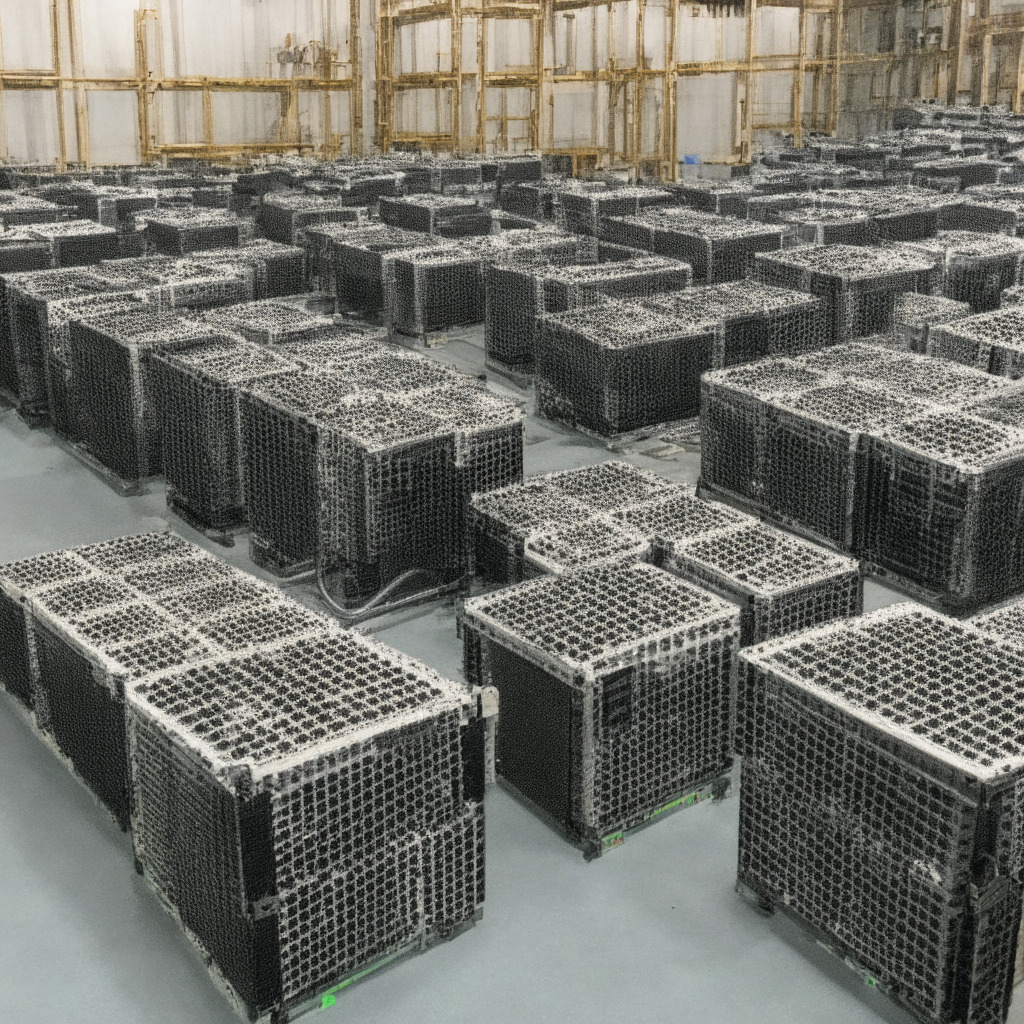“Bitcoin mining, criticized for high power consumption, might be becoming environmentally sustainable. Initiatives include utilizing hydro-cooling mining farms, small hydropower plants, and prevention of gas flaring in oil drilling. This transition, along with migration to countries offering cheaper renewable energy, could redefine Bitcoin mining’s environmental impact.”
Search Results for: Bitcoin mining
Understand the Confidence and Caution in Bitcoin Mining: A Game of Strategic Scepticism
“Bitcoin miners appear to be dispatching more Bitcoin to exchanges, both hedging potential losses and indicating robust confidence. However, amidst increasing mining difficulty and a surge in exchange activity, questions arise about the market’s health and whether this represents overly optimistic sentiment.”
U.S Bitcoin Mining Stocks’ Remarkable Comeback: Resilience Amidst Harsh Crypto Winter
Bitcoin mining stocks in the U.S have witnessed a remarkable recovery in 2023, fueled by the strong performance of Bitcoin and institutional exchange-traded-fund (ETF) filings by financial giants. Additionally, resilient miners with minimal costs have profited when Bitcoin prices surpass production costs. However, high-debt miners struggle in this harsh landscape.
UAE Emerges as New Powerhouse in Bitcoin Mining: Opportunities and Challenges
“Bitcoin mining companies are gravitating towards the UAE, now becoming a Middle Eastern hub for crypto mining. Its digital adoption, affordable energy, and crypto-friendly stance have attracted these companies. Currently, it’s home to nearly 4% of the Bitcoin global hashrate.”
Hut 8’s Shift from Bitcoin Mining to AI: The Future of Tech or a Temporary Lifeline?
“Hut 8, a previously struggling Bitcoin mining company, plans an ambitious revival by setting up in the United States and incorporating high-performance computing and AI. This move, spurred by industry rebound and Bitcoin mining profitability surge, illustrates a growing trend of integrating cryptocurrency with cutting-edge technology.”
Riot Platforms’ Massive ASIC Order: Revolutionizing Bitcoin Mining or Threat to Sustainability?
Riot Platforms acquires 33,280 mining rigs from MicroBT, increasing its hashrate capacity to 20.1 EH/s. The machines, designed for immersion cooling systems, will be deployed by Q1 2024. This groundbreaking development occurs as questions about optimizing efficiency and addressing environmental concerns in the mining industry arise.
Heating Pools with Bitcoin Mining: Eco-Concerns vs. Innovative Solutions
Brooklyn-based bathhouse, Bathouse, has implemented a small-scale Bitcoin mining operation to heat its swimming pools. Facing mixed reactions, this unique heating solution sparks debates over environmental impact, while showcasing potential innovative applications of blockchain technology.
Brooklyn Bathhouse Heats Pool with Bitcoin Mining: Innovation or Environmental Concern?
A Brooklyn bathhouse uses Bitcoin mining rigs to warm its spa, generating heat as a byproduct which is captured for heating pools. While a potential avenue for sustainable mining, concerns remain over the overall environmental impact of the cryptocurrency industry.
The Future of Bitcoin Mining: Low Electricity Costs, Sustainable Energy, and Profitability
A recent JPMorgan report emphasizes the importance of low electricity costs and sustainable energy for the survival of BTC miners in an increasingly competitive market. Lower electricity costs help maintain profitability amidst surging hashrate levels, while utilizing renewable energy sources benefits the environment and industry competitiveness.
Heating Up the Crypto Debate: Bathhouse’s Bitcoin Mining Pool Sparks Controversy
A Brooklyn-based spa, Bathhouse, uses a small-scale Bitcoin mining operation to heat their pools and operates on a “Bitcoin Standard.” This unique heating process generates mixed reactions due to Bitcoin mining’s energy consumption and environmental impact, sparking discussions on cryptocurrency innovation.
Exploring the Fusion of AI and Bitcoin Mining: Opportunities and Hurdles in High-Performance Computing
Iris Energy aims to integrate high-performance computing with bitcoin mining, in line with the growing interest in AI. The AI-driven data center space is predicted to grow to $76 billion by 2028, and companies like Iris Energy see potential in combining these technology domains despite the challenges they may face.
Arkon Energy’s US Expansion: Renewables, Bitcoin Mining Growth, and Industry Challenges
Arkon Energy plans to expand its operations to the US after acquiring a site in Ohio and raising $26 million in capital. The new facility aims to provide bitcoin mining firms with server hosting services, creating a predictable revenue stream in the challenging crypto market. Amid uncertainties, Arkon’s innovative adaptation offers growth opportunities for industry stakeholders.
Is Bitcoin Mining Worth It? Evaluating Profitability vs. Direct Investment in Crypto
Research suggests that buying Bitcoin (BTC) directly is often more profitable than mining it at home due to labor-intensive and costly processes. Bitcoin miners are only profitable if they recoup 100% of capital spent on equipment, excluding operational costs. However, mining can be a profitable venture for those with access to low electricity prices.
Roblox Bitcoin Mining Simulator Outshines Web3 Metaverse: A Curious Crypto Phenomenon
In the Roblox metaverse, Bitcoin Miner Beta allows users to simulate real-life bitcoin mining, gaining more popularity than actual cryptocurrency metaverse platforms. This raises questions about the popularity of Web3 metaverse projects and the future convergence between Web2 and Web3 gaming experiences.
Tether Invests in El Salvador’s Volcano Energy: Eco-friendly Bitcoin Mining or Environmental Risk?
Tether announced a $250 million investment in El Salvador’s Volcano Energy project, aimed at creating a major Bitcoin mining farm powered by solar and wind energy. However, concerns regarding environmental impact and resource management persist, urging cautious progress towards a sustainable crypto mining future.
Marathon’s 77% Bitcoin Mining Surge: Proprietary Software or Untapped Capacity?
Bitcoin miner Marathon Digital Holdings experienced a 77% spike in their Bitcoin mining production in May, attributed to its proprietary software, an increased hash rate, rising transaction fees, and the growing popularity of Ordinals protocol. However, maintaining a balanced perspective and managing expectations is advised.
BLOK ETF Surge in Bitcoin Mining: Potential Rewards vs. Environmental Concerns
Amplify Investments’ blockchain ETF, BLOK, has increased its allocation to Bitcoin mining companies from less than 10% to 21%. Amidst concerns about market transparency, regulation, and environmental impact, this move reflects optimism in the oversold market and highlights the potential rewards of investing in the mining sector.
Texas Bitcoin Mining Boom: Supportive Legislation and State-Level Tug of War
Texas embraces bitcoin mining as legislators pass supportive bills, SB 1929 and HB 591, solidifying the state’s position as a premier destination for the industry. However, future federal-level regulation remains uncertain, with individual states currently leading policy development.
Bitcoin Mining Difficulty Soars: Impact of Ordinals Protocol and Upcoming Halving Dilemma
Bitcoin mining difficulty is set to reach a new record high of 50.91 trillion, reflecting the growing number of mining machines. This surge occurs alongside the Bitcoin network’s hashrate rally and increased network fees, resulting in boosted profitability for miners. With the Ordinals protocol enabling NFTs and BRC-20 tokens on the Bitcoin blockchain, demand for block space increases, maintaining high network fees and incentivizing more miners to join.
Texas Bill Stalling: Implications for Bitcoin Mining and Grid System Sustainability
The Texas SB 1751 bill, aimed at restricting bitcoin miners’ participation in cost-saving grid programs and abolishing tax abatements, has stalled in the state House of Representatives. The stagnation leaves the future uncertain for the burgeoning mining industry in Texas, opening possibilities for further discussions and decision-making regarding the cryptocurrency mining landscape.
Tether’s Sustainable Bitcoin Mining in Uruguay: Eco-Friendly Move or Shaky Investment?
Tether is venturing into sustainable Bitcoin mining in Uruguay, focusing on environmentally friendly operations. With over 98% renewable energy generation, the country offers a unique opportunity for greener crypto mining. Tether’s commitment aims to minimize ecological footprints and uphold the security and integrity of the Bitcoin network.
Tether Leverages Uruguay’s Renewable Energy for Bitcoin Mining: Eco-Friendly Progress or Not Enough?
Tether expands into Bitcoin mining in Uruguay, leveraging the country’s 94% renewable energy sources. While reducing ecological footprint, it also raises environmental concerns and emphasizes the importance of balancing innovation with ecological impact.
Tether’s Green Bitcoin Mining Strategy in Uruguay: A Sustainable Future or Just Hype?
Tether plans to launch a Bitcoin mining operation in Uruguay, primarily due to the country’s remarkable renewable energy capabilities. With over 98% of electricity generated from renewables, Tether aims to minimize its ecological footprint while maintaining Bitcoin network security and integrity.
Sustainable Bitcoin Mining: Tether’s Move to Uruguay and its Impact on Environment & Economy
Tether, the largest stablecoin company, plans to mine Bitcoin in Uruguay using renewable energy for a minimal ecological footprint. The move aims to diversify and strengthen the company’s stablecoin reserves, while addressing concerns about the environmental impact of crypto mining and highlighting potential economic benefits for local communities, particularly in rural areas.
Tether’s Leap into Sustainable Bitcoin Mining: Boon or Smokescreen?
Tether has invested in a sustainable Bitcoin mining facility in Uruguay, aiming to promote responsible and eco-friendly mining practices. However, the company must also address transparency and security concerns to maintain trust in the stablecoin market.
Bitcoin Mining Difficulty Nears 50T: The Impact on Miners and Blockchain Growth
Bitcoin mining difficulty is set to surpass a record 50T, driven by factors like the Bitcoin price rally and the surge in popularity of the Ordinals protocol. Increasing difficulty levels impact miner profitability but also stimulate growth within the network, with transaction fees tripling, benefiting miners’ revenue.
Biden’s 30% Bitcoin Mining Tax: Balancing Environmental Concerns and Industry Growth
Senator Cynthia Lummis strongly opposes the Biden Administration’s proposal for a 30% tax on electricity for Bitcoin miners. Critics argue this could drive the industry offshore, while supporters claim it addresses environmental concerns. The debate highlights complexities in regulating the digital asset industry and balancing consumer protection, sustainability, and innovation.
Bitcoin Mining: Debunking Environmental Myths and Uncovering the Class Conflict
This article investigates the environmental impact of Bitcoin mining, specifically at the Greenidge facility in upstate New York. Despite claims of environmental harm, many locals support Greenidge for its job creation and community investments. The piece explores the broader cultural and political implications of Bitcoin mining in the United States.
Bitcoin Mining: Savior or Strain on Texas Power Grid? Pros, Cons & the Ongoing Debate
A recent paper suggests that Bitcoin mining loads can help mitigate power shortages in Texas if managed correctly. The state faces concerns about the grid’s ability to handle mining activities. Financial incentives and location strategies can enhance grid-supporting capabilities and alleviate reliability concerns, while legislation and collaboration are needed for sustainable solutions.
Greenidge Generation: Surprising Local Support for Bitcoin Mining Facility
Greenidge Generation, a Bitcoin mining facility in New York, has won local support despite initial concerns about its environmental impact. Accurate information and engaging with local communities are key in shaping policy and perception of mining operations.
Biden’s Proposed 30% Bitcoin Mining Tax: Impact on National Security and Clean Energy
Sen. Cynthia Lummis addressed concerns over President Biden’s proposed 30% excise tax on Bitcoin miners, stating it could negatively impact both Bitcoin mining and national security. Although lawmakers remain skeptical due to criminal activity associations, Lummis emphasizes the importance of promoting Bitcoin mining in the US for energy security and potential environmental advantages.
Bitcoin Mining Difficulty Soars: Implications for Future Adoption and Market Growth
This article explores the potential growth in value and market demand of Bitcoin as the mining difficulty level reaches an unparalleled milestone, indicating robustness of the network and surging interest. It discusses the influence on miner profitability and the relationship between mining difficulty and hashrate, while examining Bitcoin’s price trajectory and key support levels.































